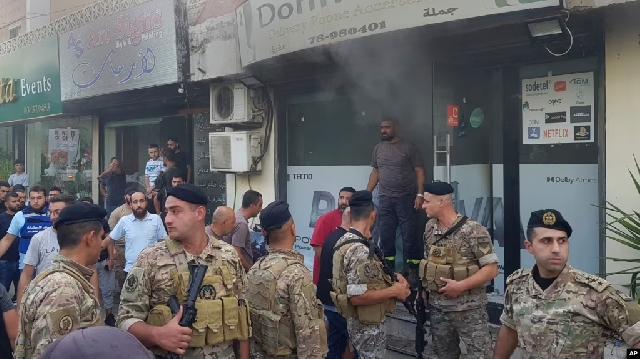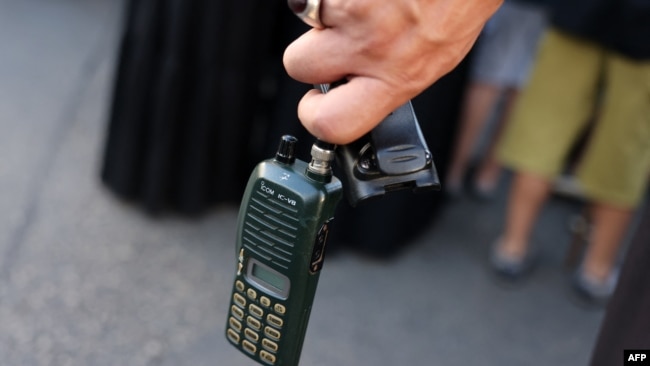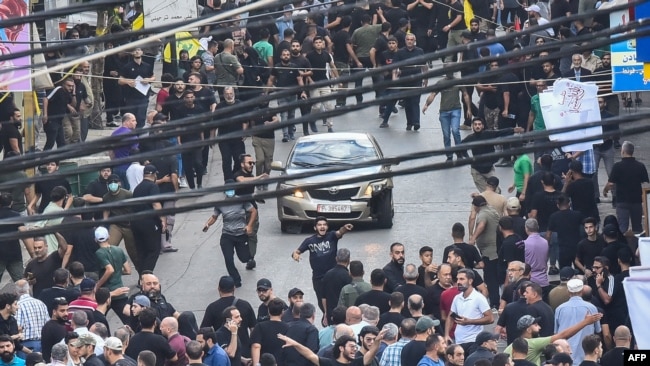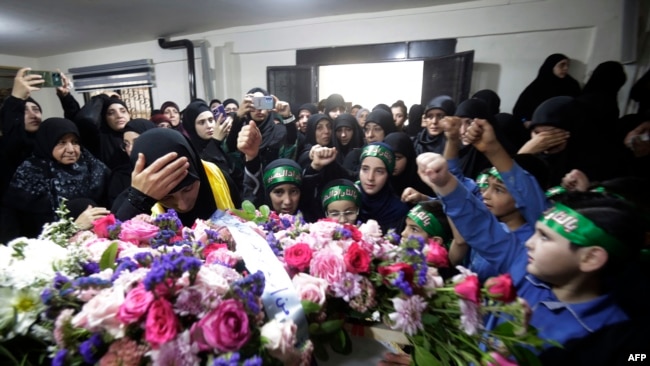20 killed, 450 injured in Lebanon walkie-talkie explosions targeting Hezbollah
 Lebanese soldiers gather outside a damaged mobile shop after what is believed to be the result of a walkie-talkie exploding inside it, in the southern port city of Sidon, Lebanon, Sept. 18, 2024
Lebanese soldiers gather outside a damaged mobile shop after what is believed to be the result of a walkie-talkie exploding inside it, in the southern port city of Sidon, Lebanon, Sept. 18, 2024
At least 20 people were killed and 450 were injured Wednesday in a new round of explosions in Lebanon, with the latest blasts from remotely detonated walkie-talkies used by Hezbollah militants.
At least one of the blasts occurred near one of the funerals organized by Iran-backed Hezbollah for three Hezbollah members and a child, who were among the 12 killed on Tuesday when thousands of pagers used by the group exploded across the country, wounding nearly 3,000 people.
Hezbollah blamed the attacks on Israel, which has not commented even as security experts in the Mideast and the U.S. told U.S. media outlets that Tuesday’s pager attacks were the work of Mossad, the Israeli intelligence agency.
On Wednesday, Hezbollah said that in retaliation it had attacked Israeli artillery positions with rockets, the first strike targeting its archenemy and raising the prospect of a wider Middle East war.
A security source said that the walkie-talkies were purchased by Hezbollah five months ago, about the same time that the pagers were bought. A senior Lebanese security source and another source told Reuters that Mossad, which has a long history of sophisticated operations on foreign soil, planted explosives inside the pagers months before Tuesday's detonations.
 | A man holds a walkie-talkie device after he removed the battery, in Beirut's southern suburbs on Sept. 18, 2024
| A man holds a walkie-talkie device after he removed the battery, in Beirut's southern suburbs on Sept. 18, 2024
Hezbollah officials and Lebanon's state media said Wednesday’s explosions went off in Beirut and several parts of Lebanon. In addition, Lebanon's official news agency reported that solar energy systems exploded in homes in several areas of Beirut and in southern Lebanon, wounding at least one girl.
Dr. Tania Baban, a physician in Lebanon working for the U.S.-based medical charity MedGlobal, told VOA that her group performed more than 460 surgeries related to the pager blasts on Tuesday, including finger and hand amputations.
She said people carrying the pagers heard them beep, supposedly with messages from Hezbollah leaders, and were reading the messages when the devices exploded. Because they held them close to their faces to read, they sustained hand, eye, neck and facial injuries, while others suffered abdominal and other injuries if they still had the pagers attached to their waistlines.
“Now this comes after obviously a stressful period of 11 months of Lebanon’s southern border going into war with northern Israel,” Baban said. “So, there has always been the threat of the possibility of an escalation nationwide.”
Watch related report by Linda Gradstein:
U.S. Secretary of State Antony Blinken said Wednesday in Egypt the U.S. is assessing how the attacks could affect efforts to negotiate a cease-fire in the Israel-Hamas war in Gaza, now in its 12th month.
Sources in the Israeli government anonymously said Wednesday the country is moving more troops to its border with Lebanon as a precautionary measure.
Through a spokesman, United Nations Secretary-General Antonio Guterres said he was “deeply alarmed” by the remotely detonated explosions. He urged “all concerned actors to exercise maximum restraint to avert any further escalation.”
In Cairo, Blinken told reporters that the United States was neither aware of nor involved in Tuesday’s pager-blast incidents, while also expressing concerns about regional escalation.
“We remain very clear about the importance of all parties avoiding any steps that could further escalate the conflict,” Blinken said during a joint press conference with Egyptian Foreign Minister Badr Abdelatty. “It’s imperative that all parties refrain from any actions that could escalate the conflict."
 | People react around a car after a reported explosion occurred during the funeral of those killed when hundreds of paging devices exploded across Lebanon the previous day, in Beirut's southern suburbs, Sept. 18, 2024
| People react around a car after a reported explosion occurred during the funeral of those killed when hundreds of paging devices exploded across Lebanon the previous day, in Beirut's southern suburbs, Sept. 18, 2024
Before the Wednesday attacks, Abdelatty condemned the detonations of the pagers and any unilateral actions that violate “the sovereignty of Lebanon.”
Speaking through a translator, he said, “We are on the brink of a comprehensive war,” he said trough a translator.
The Tuesday pager attacks came hours after the Israeli government announced a broadening of its goals in the war against Hamas militants in Gaza to include the securing of northern Israel from Hezbollah rocket attacks.
But some former intelligence officials argue the detonation of Hezbollah pagers, two-way radios and other devices may be part of an Israeli effort to achieve its goals without having to fight.
“What Israel is trying to do is take this far enough so they can deter Hezbollah from launching 50-60 rocket attacks a day … without risking a wider war,” said Daniel Hoffman, a retired U.S. clandestine services officer and former chief of station with the CIA.
Hoffman told VOA the suspected Israeli operation could also serve to weaken Hezbollah’s standing in Lebanon.
“It seeks to drive a wedge between regular folks and Hezbollah,” he said. “The message is, ‘You don’t want to be around them [Hezbollah].’”
And Hoffman said, given Israel’s intelligence capabilities, it is not impossible that it could target more Hezbollah devices in the future.
Other former intelligence officials have suggested that the operation to blow up pagers and other communication devices also gives Israel an advantage should tensions with Hezbollah escalate.
Notably, they said, the explosions have at least debilitated Hezbollah’s ability to communicate in a crisis while at the same time removing key militants from the battlefield.
Hezbollah began using the pagers, in particular, after the group’s leader ordered members to stop using cellphones amid concerns that Israeli intelligence could intercept and track their communications.
Security experts in the Mideast and the United States told U.S. media outlets they believe that somehow Israeli agents intercepted the shipment of the pagers to add the explosives to the devices before they arrived in Lebanon and were handed out by Hezbollah.
Hsu Ching-Kuang, founder of Taiwan-based manufacturer Gold Apollo, told reporters Wednesday his company did not manufacture the pagers, even though its corporate markings were on them when the remains of the exploded devices were examined Tuesday.
He said Gold Apollo had authorized its brand to be used on devices produced and sold by a company called BAC in the Hungarian capital of Budapest.
Iranian state media reported the country’s ambassador to Lebanon, Mojtaba Amani, was among those wounded by an exploding pager, reportedly losing an eye.
 | Relatives mourn Fatima Abdallah, a 10-year-old girl killed after hundreds of paging devices exploded in a deadly wave across Lebanon, during her funeral in the village of Saraain in the Bekaa valley, Sept. 18, 2024
| Relatives mourn Fatima Abdallah, a 10-year-old girl killed after hundreds of paging devices exploded in a deadly wave across Lebanon, during her funeral in the village of Saraain in the Bekaa valley, Sept. 18, 2024
Iran’s envoy to the United Nations on Wednesday said in a letter that Tehran is considering its options.
Iran "reserves its rights under international law to take required measures deemed necessary to respond,” the letter said.
Iran’s support for Hezbollah and Hamas, and the ongoing conflicts in Gaza and along the Israel-Lebanon border, had already raised fears of a wider regional conflict.
EU foreign policy chief Josep Borrell called the situation “extremely worrying,” and said he discussed it in a call with Lebanese Foreign Minister Abdallah Bou Habib.
“Even if the attacks seem to have been targeted, they had heavy, indiscriminate collateral damages among civilians, including children among the victims,” Borrell said.
Jeff Seldin, Nike Ching contributed to this report.
Source: voanews.com
Trending World

More than 100 humanitarian groups warn of mass starvation in Gaza
15:32
Deepfake deception: Indian woman's identity stolen for erotic AI content
14:53
Africa to be hit hard as UK foreign aid cuts revealed
14:46
Air India crash victim's son says he received wrong remains
14:38
Wildfires rage in Greece and Turkey as extreme heat persists
09:58
China offers parents $1,500 in bid to boost births
12:16
Putin must agree Ukraine ceasefire in 10 or 12 days, says Trump
12:11
Nigeria kidnappers kill 35 hostages even after ransom paid
12:06
U.S. economy grew at a 3% rate in Q2, a better-than-expected pace even as Trump’s tariffs hit
14:51




